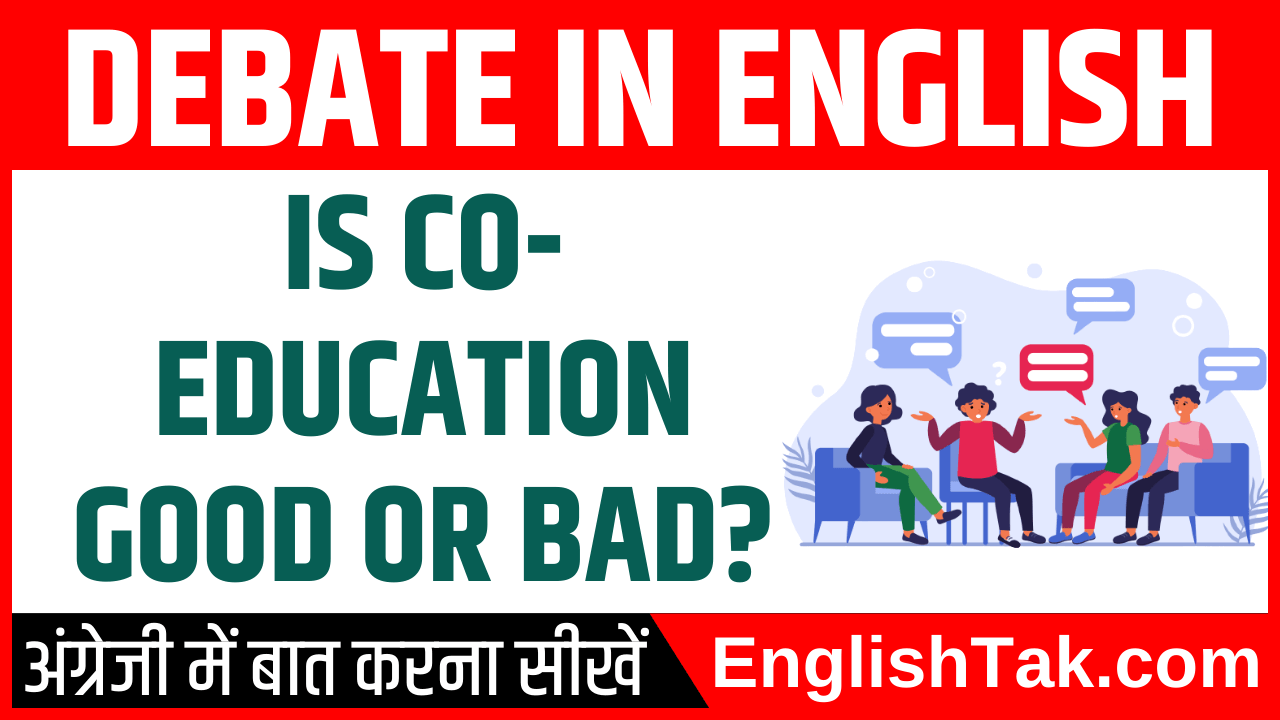![]()
Debate – Is Co-Education Good or Bad?
Table of Contents
Today, I am going to post a Debate – Is Co-Education Good or Bad? If you want to improve your communication skills in English, you must take part in Debate. Here is a sample Debate.
Debate – Is Co-Education Good or Bad?
Group 1: Arguing that Co-Education is Good
Hello friends & My dear teacher, Today we are here to discuss whether co-education, where boys and girls study together, is good or bad. We strongly believe that co-education is a positive approach, and here’s why.
Firstly, co-education helps students develop better social skills. When boys and girls study together, they learn to interact and communicate with each other. This prepares them for the real world, where they will have to work and cooperate with people of different genders.
Secondly, co-education promotes equality. In a co-educational setting, both boys and girls have the same opportunities to learn and succeed. There is no discrimination based on gender. This helps break down stereotypes and promotes fairness.
Furthermore, co-education prepares students for the future. In most jobs and careers, men and women work together. By studying in a co-educational environment, students learn to collaborate and understand different perspectives. This will benefit them in their professional lives.
In conclusion, co-education is a good thing because it helps students develop social skills, promotes equality, and prepares them for the future. It provides a balanced and inclusive learning environment that benefits all students.
Debate – Is Co-Education Good or Bad?
Group 2: Arguing that Co-Education is Bad
Hello friends & My dear teacher, while our opponents have presented their arguments in favor of co-education, we believe there are valid concerns that make co-education a problematic approach.
Firstly, the presence of both boys and girls in the same classroom can lead to distractions. Adolescents are at a stage where they are discovering their feelings and emotions, and this can affect their focus on studies. Separating boys and girls may help minimize distractions and create a more conducive learning environment.
Secondly, some argue that co-education hinders academic performance. Boys and girls may have different learning styles and speeds, and separating them may allow teachers to tailor their teaching methods accordingly. This can lead to better academic outcomes for both genders.
Additionally, co-education can perpetuate gender stereotypes. Boys and girls may feel pressure to conform to societal expectations, leading to limited career choices and opportunities. Separating them can create an environment where students feel free to pursue their interests without any biases or stereotypes.
In conclusion, we believe that separating boys and girls in education can minimize distractions, allow for tailored teaching methods, and create an environment free from gender stereotypes. This approach may lead to better academic performance and more diverse career choices for students.
Conclusion :- You can add some more points to this.
Difficult Words with Hindi Meaning
1. Esteemed – प्रतिष्ठित (Pratishthit) – Highly respected or admired.
2. Fosters – पोषण करना (Poshan karna) – Encourages or promotes the development of something.
3. Inclusive – सब सम्मिलित (Sab sammilit) – Including everyone; not excluding any particular group or individual.
4. Stereotypes – मान्यता (Manyata) – Fixed or oversimplified ideas or beliefs about a particular group of people.
5. Fairness – न्याय (Nyay) – The quality of treating people equally and without bias.
6. Collaboration – सहयोग (Sahyog) – Working together with others to achieve a common goal.
7. Valid – वैध (Vaidh) – Legally or logically acceptable; sound or justifiable.
8. Conducive – अनुकूल (Anukool) – Making a particular situation or outcome likely or possible.
9. Distractions – ध्यान भटकाने वाली चीजें (Dhyaan bhatkane wali cheejen) – Things that divert or take away one’s attention from what they are doing.
10. Adolescents – किशोर (Kishor) – Young people who are in the transitional period between childhood and adulthood.
11. Conform – अनुरूप होना (Anuroop hona) – To behave or think in a way that is socially accepted or expected.
12. Biases – पक्षपात (Pakshapat) – Prejudices or preferences for or against something or someone, often without considering the facts objectively.
Spoken English Course in Hindi
Most Useful Telephoning Phrases
Normal English Vs IELTS English





